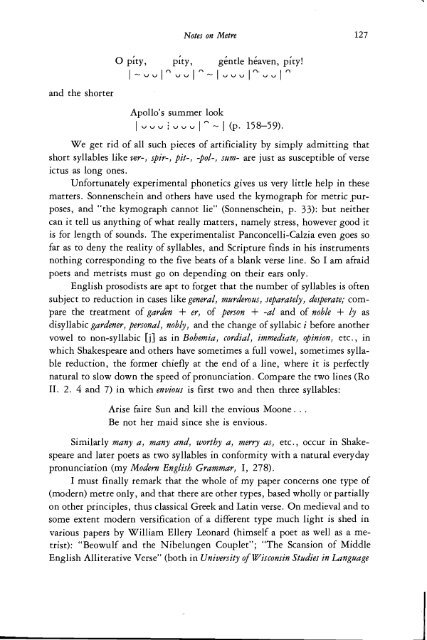OTTO JESPERSEN Notes on Metre - UMR 7023
OTTO JESPERSEN Notes on Metre - UMR 7023
OTTO JESPERSEN Notes on Metre - UMR 7023
You also want an ePaper? Increase the reach of your titles
YUMPU automatically turns print PDFs into web optimized ePapers that Google loves.
and the shorter<br />
<str<strong>on</strong>g>Notes</str<strong>on</strong>g> <strong>on</strong> <strong>Metre</strong> 127<br />
o pity, pity, gentle heaven, pity!<br />
I - v V 11""1 V v I f"\ - I v v v I f"\, V v I f"\<br />
Apollo's summer look<br />
I v v v ; v v v I f"\ - I (p. 158-59).<br />
We get rid of all such pieces of artificiality by simply admitting that<br />
short syllables like ver-, spir-, Pit-, -pol-, sum- are just as susceptible of verse<br />
ictus as l<strong>on</strong>g <strong>on</strong>es.<br />
Unfortunately experimental ph<strong>on</strong>etics gives us very little help in these<br />
matters. S<strong>on</strong>nenschein and others have used the kymograph for metric .purposes,<br />
and "the kymograph cannot lie" (S<strong>on</strong>nenschein, p. 33): but neither<br />
can it tell us anything of what really matters, namely stress, however good it<br />
is for length of sounds. The experimentalist Panc<strong>on</strong>celli-Calzia even goes so<br />
far as to deny the reality of syllables, and Scripture finds in his instruments<br />
nothing corresp<strong>on</strong>ding to the five beats of a blank verse line. So I am afraid<br />
poets and metrists must go <strong>on</strong> depending <strong>on</strong> their ears <strong>on</strong>ly.<br />
English prosodists are apt to forget that the number of syllables is often<br />
subject to reducti<strong>on</strong> in cases like general, murderous, separately, desperate; compare<br />
the treatment of garden + er, of pers<strong>on</strong> + -al and of noble + Iy as<br />
disyllabic gardener, pers<strong>on</strong>al, nobly, and the change of syllabic i before another<br />
vowel to n<strong>on</strong>-syllabic [j] as in Bohemia, cordial, immediate, opini<strong>on</strong>, etc., in<br />
which Shakespeare and others have sometimes a full vowel, sometimes syllable<br />
reducti<strong>on</strong>, the former chiefly at the end of a line, where it is perfectly<br />
natural to slow down the speed of pr<strong>on</strong>unciati<strong>on</strong>. Compare the two lines (Ro<br />
II. 2. 4 and 7) in which envious is first two and then three syllables:<br />
Arise faire Sun and kill the envious Mo<strong>on</strong>e ...<br />
Be not her maid since she is envious.<br />
Similarly many a, many and, worthy a, merry as, etc., occur in Shakespeare<br />
and later poets as two syllables in c<strong>on</strong>formity with a natural everyday<br />
pr<strong>on</strong>unciati<strong>on</strong> (my Modern English Grammar, I, 278).<br />
I must finally remark that the whole of my paper c<strong>on</strong>cerns <strong>on</strong>e type of<br />
(modern) metre <strong>on</strong>ly, and that there are other types, based wholly or partially<br />
<strong>on</strong> other principles, thus classical Greek and Latin verse. On medieval and to<br />
some extent modern versificati<strong>on</strong> of a different type much light is shed in<br />
various papers by William Ellery Le<strong>on</strong>ard (himself a poet as well as a metrist):<br />
"Beowulf and the Nibelungen Couplet"; "The Scansi<strong>on</strong> of Middle<br />
English Alliterative Verse" (both in University o/Wisc<strong>on</strong>sin Studies in Language

















